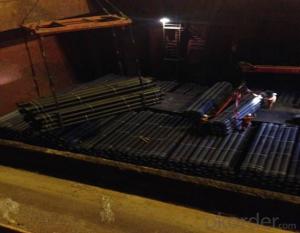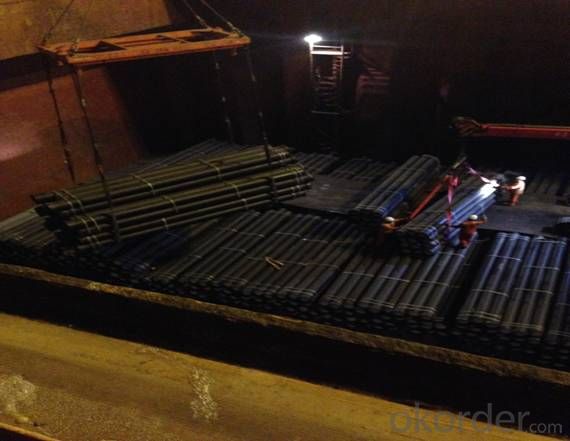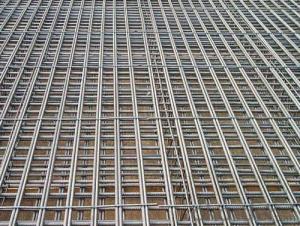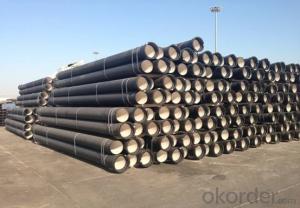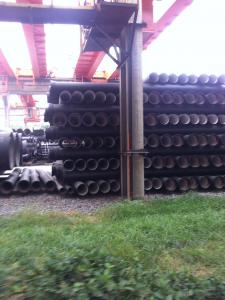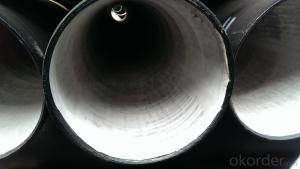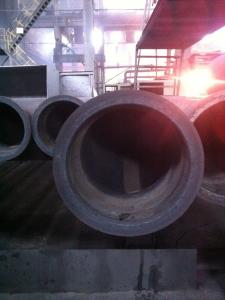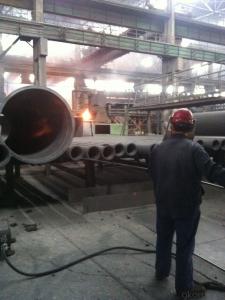DUCTILE IRON PIPES AND PIPE FITTINGS K9 CLASS DN1600
- Loading Port:
- Tianjin
- Payment Terms:
- TT OR LC
- Min Order Qty:
- 22 pc
- Supply Capability:
- 3000 pc/month
OKorder Service Pledge
OKorder Financial Service
You Might Also Like
Material : Ductile Cast Iron
Size Range : DN 80mm to DN 2000mm
Unit Effective Length : 6m or 5.7m
Manufacture Standard: ISO 2531:1998/ EN 545:2006/EN 598:2007
Annual capacity : 200,000 tons
Coating Exterior: Zinc 130g/m2 according to ISO 8179-1 and bitumen coating 70 microns.
Cement Interior: Portland Cement/ High Alumina Cement/ Sulphate Resisting Cement Lining according to ISO 4179
Special requirements on external coating and internal lining can be applied
We also provide accessories such as SBR/EPDM rubber gaskets, lubricant paste, pipe caps, PE sleeves, etc.
Additional Parts:
Each pipe is strictly inspected according to related standard to ensure permanently high performance.
Easy Installation at site and service free for life
Long Service Lifespan
Quotation will arrive you within 24hours once we get your inquiry.
We guarantee offering you a competitive price.
A copy of original inspection reports of pipes will be offered after shipment.
Photos of loading process will be sent to the customer after shipment effect.
We will follow-up the delivery progress after shipment effect and update to the customer on weekly basis.
- Q: Are ductile iron pipes suitable for power plant applications?
- Ductile iron pipes are a suitable choice for power plant applications. Unlike traditional cast iron pipes, ductile iron pipes have improved strength, durability, and flexibility. These properties make them ideal for power plants, where they face high pressure, extreme temperatures, and corrosive environments. Power plants require a reliable and strong piping system to transport various fluids, including water, steam, and chemicals. Ductile iron pipes have a high tensile strength and can withstand high pressure, ensuring the safe and efficient flow of fluids within a power plant. They are particularly suitable for power generation applications that involve high-pressure steam. Moreover, ductile iron pipes have excellent corrosion resistance, which is crucial in power plants where many fluids are highly corrosive. The internal and external linings of these pipes protect them from corrosion, ensuring a longer service life and reducing maintenance costs. This corrosion resistance also makes them suitable for transporting chemicals and wastewater within a power plant. In addition, ductile iron pipes can withstand extreme temperatures. Power plants often operate at high temperatures, and ductile iron pipes can handle these conditions without compromising their structural integrity. They have a high melting point and can resist thermal expansion and contraction, making them a suitable choice for applications involving hot fluids and steam. Furthermore, ductile iron pipes are cost-effective compared to other commonly used materials in power plants, such as stainless steel or carbon steel. They offer a balance between performance and cost, making them an attractive choice for power plant applications. In conclusion, ductile iron pipes have the necessary characteristics to meet the demands of power plant applications. Their strength, durability, flexibility, corrosion resistance, and ability to withstand high pressures and extreme temperatures make them well-suited for such environments. Additionally, their cost-effectiveness makes them a practical choice for power plant piping systems.
- Q: How are ductile iron pipes protected against internal scaling or buildup?
- Ductile iron pipes are protected against internal scaling or buildup through various methods. One of the most common methods is the application of cement mortar lining on the inner surface of the pipes. This lining acts as a protective barrier, preventing the formation of scale or buildup and ensuring a smooth flow of water or other fluids. Additionally, the pipes can be coated with a layer of polyethylene or other suitable materials to provide an extra level of protection against scaling or buildup. This coating acts as a barrier between the water and the iron surface, reducing the chances of corrosion or scale formation. Regular maintenance and cleaning are also crucial in preventing internal scaling or buildup in ductile iron pipes. Flushing the pipes with high-pressure water or using chemical treatments can help remove any accumulated scale or debris, ensuring the pipes remain clean and functional. Furthermore, proper water treatment is important to minimize the risk of scaling or buildup. Implementing appropriate water treatment processes, such as pH adjustment or the use of corrosion inhibitors, can help maintain the quality of the water and prevent the formation of scale or buildup inside the pipes. In conclusion, ductile iron pipes are protected against internal scaling or buildup through various measures, including cement mortar lining, pipe coating, regular maintenance, cleaning, and proper water treatment. These measures ensure the longevity and efficiency of the pipes, minimizing the chances of clogging or reduced flow capacity.
- Q: How can the internal and external walls of ductile iron pipes be protected from corrosion?
- The inner wall is not needed and the outer wall is painted
- Q: Can ductile iron pipes be used in marine environments?
- Yes, ductile iron pipes can be used in marine environments. Ductile iron is a type of cast iron that exhibits excellent mechanical properties, high corrosion resistance, and durability. These properties make it suitable for various applications, including marine environments. Marine environments are known to be highly corrosive due to the presence of saltwater, high humidity, and other harsh conditions. However, ductile iron pipes are designed to withstand such conditions. They have a protective layer called the "graphite skin" that acts as a barrier against corrosion. This graphite skin helps to prevent the formation of rust and protects the pipe from degradation. Furthermore, ductile iron pipes can also be protected with additional coatings or linings to enhance their resistance to corrosion in marine environments. These protective coatings can include epoxy, polyurethane, or zinc coatings. These coatings act as an extra layer of defense against corrosion, ensuring the longevity and reliability of the pipes in marine environments. It is important to note that proper maintenance and regular inspection are necessary to ensure the optimal performance of ductile iron pipes in marine environments. This includes regular cleaning to remove any marine growth or debris that may accumulate on the pipes and conducting routine inspections to detect any signs of corrosion or damage. In conclusion, ductile iron pipes can indeed be used in marine environments. Their inherent corrosion resistance, durability, and the ability to apply additional protective coatings make them a suitable choice for various marine applications.
- Q: What is ductile iron?
- Ductile iron, after being treated with either magnesium or cerium, undergoes an improvement in its mechanical properties. This particular type of cast iron earns the name "ductile" due to its higher degree of ductility in comparison to other cast iron varieties. Ductility pertains to a material's capacity to stretch or deform without breaking. This quality renders ductile iron particularly ideal for applications that demand both high strength and resistance to wear and tear, such as pipes, automotive components, and machinery parts. The inclusion of magnesium or cerium during the manufacturing process aids in the formation of graphite within the iron's structure, contributing to its distinctive properties. This graphite formation serves to enhance the iron's flexibility and reduce its brittleness, enabling it to absorb shock and vibrations without fracturing. As a whole, ductile iron presents a fine balance between the strength of cast iron and the flexibility of steel, thereby establishing itself as a versatile material well-suited for diverse industrial applications.
- Q: What kind of valves are commonly used in ductile iron pipes?
- Gate valve, butterfly valve, globe valve, check valve flange of various valves, (but the pipeline used for water supply and some limitations of the transport medium may be prescribed valve type) now due to material improvements in the technology, in most cases, smaller pipe diameter is also large diameter pipe outlet valve, butterfly valve, because of the pipeline the large diameter pressure in the pipeline and water than the small caliber to open and close the valve, to human hard, efficiency is not high, so for butterfly valve,
- Q: Can ductile iron pipes be used for underground chemical processing systems?
- Ductile iron pipes are generally not recommended for use in underground chemical processing systems due to their limited resistance to corrosion from various chemicals. While ductile iron pipes are known for their strength, durability, and flexibility, they are still vulnerable to corrosion when exposed to certain chemicals, especially those with high acidity or alkalinity. In underground chemical processing systems, there is a higher risk of exposure to corrosive substances that can deteriorate the ductile iron pipes over time. This can lead to leaks, cracks, and failures in the piping system, compromising its integrity and potentially causing hazardous conditions. For underground chemical processing systems, it is advisable to consider alternative materials that are more resistant to corrosion, such as stainless steel, PVC, or high-density polyethylene (HDPE) pipes. These materials offer superior chemical resistance and can withstand the harsh conditions typically present in chemical processing environments. It is crucial to consult with experts in chemical engineering, piping design, and corrosion resistance to determine the most suitable materials for underground chemical processing systems. Proper material selection is vital to ensure the longevity and safety of the piping infrastructure in such environments.
- Q: How do ductile iron pipes handle water hammer?
- Ductile iron pipes are well-suited to handle water hammer due to their inherent strength and flexibility. The high tensile strength of ductile iron helps absorb and dampen the pressure surges caused by water hammer, preventing any significant damage to the pipes. Additionally, the inherent ductility of these pipes allows them to flex and absorb the impact of water hammer, reducing the likelihood of cracks or bursts. Overall, ductile iron pipes provide a reliable and durable solution for managing water hammer in water distribution systems.
- Q: Can ductile iron pipes be used in areas with high levels of groundwater contamination?
- Ductile iron pipes can be used in areas with high levels of groundwater contamination. Ductile iron is a strong and durable material that is resistant to corrosion, making it suitable for various environments, including those with contaminated groundwater. It offers a high level of resistance to chemicals and can withstand the corrosive effects of contaminants that may be present in the groundwater. Additionally, ductile iron pipes have a protective lining which further enhances their resistance to corrosion. However, it is important to note that the suitability of ductile iron pipes in such areas also depends on the specific nature and concentration of contaminants present in the groundwater. Consultation with experts and adherence to local regulations and industry standards is crucial to ensure the appropriate selection and installation of pipes for areas with high levels of groundwater contamination.
- Q: Advantages and disadvantages of ductile iron pipes?
- Ductile iron pipes are mainly heated and annealed by intermediate frequency furnace, and then made as lining cement. The cast iron pipe is not made of lining cement.
Send your message to us
DUCTILE IRON PIPES AND PIPE FITTINGS K9 CLASS DN1600
- Loading Port:
- Tianjin
- Payment Terms:
- TT OR LC
- Min Order Qty:
- 22 pc
- Supply Capability:
- 3000 pc/month
OKorder Service Pledge
OKorder Financial Service
Similar products
Hot products
Hot Searches
Related keywords
